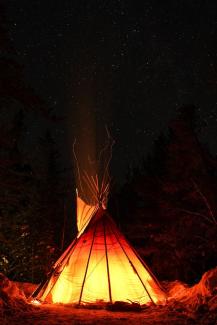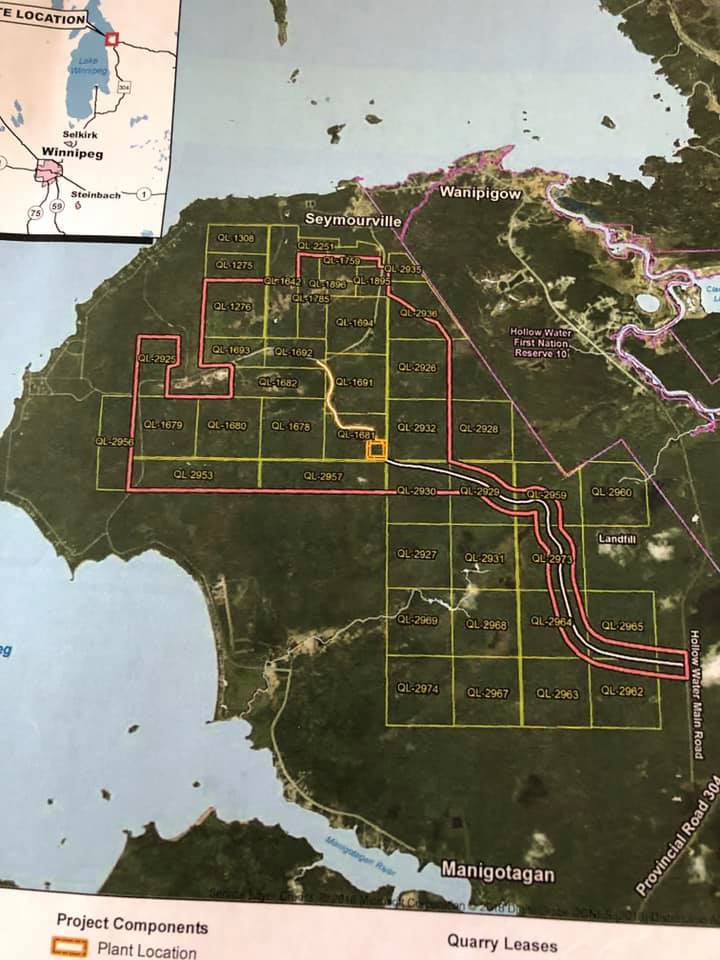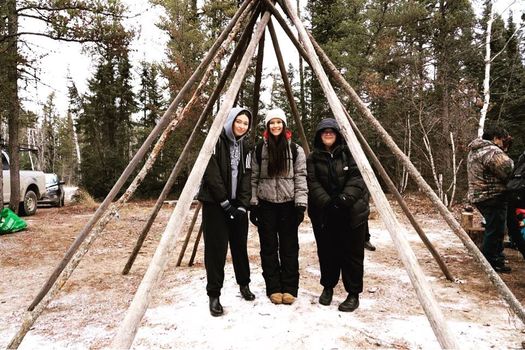Manitoba’s Camp Morningstar Continues Its Fight Against Silica Sand Mining on Sacred Indigenous Lands
21 Maret 2024agnes

By MJ McCarron
Even though Camp Morningstar’s final appeal was denied, allowing Canadian Premium Sand to continue destroying the sacred lands of Hollow Water First Nation, Camp Morningstar is ramping up its fight to pressure the Province of Manitoba to implement Free, Prior and Informed Consent before transition mineral exploration threatens more First Nations’ lands on Treaty 5 Territory. Manitoba has 29 of 31 transition minerals (also called critical minerals by the mining industry) mostly in two streaks, one across the North and one along the Bird River area in the South.
After five years, the environmental license for the Wanipigow/Hollow Water Sand Mine was granted to Canadian Premium Sand without meaningful consultation at a time when the rest of the boreal forest in eastern Manitoba faces rampant transition mineral prospecting and exploration.
Historical impacts were not part of the environmental review process, dismissing the cumulative effects of resource extraction on the region including the waste from a gold mine tailings pond upstream on the Wanipigow River, the source of drinking water for Hollow Water First Nation. By the time the gold mine received its Environmental Act License, 98 hectares of trapline had been razed when the original tailings pond failed. Forestry also accidentally destroyed large swaths of timber in massive forest fires in 1989.
Historically, the original territory of Hollow Water First Nation before reserves were assigned, has been under resource extraction pressure since the arrival of the first settlers. Lumber, coal, fish, and a lath mill were established on Black Island, while the Peoples were relocated to the mainland where the Indian Act stipulated they could not leave unless they had a pass and could not hire a lawyer to defend their land rights. Those laws were just lifted in the 1950s and 1960s. By that time, sacred sites were forever lost on Black Island.
The mainland also experienced impact. Gold mining polluted the Wanipigow River, the source of drinking water for the Hollow Water First Nation. Approximately 90 hectares of trapping grounds were lost as a result of a tailings spill. Of course, the new reserve sites were located on what, at the time, was considered unusable land. Now, much of that same land is being prospected for transition minerals.
Resource exploitation is not new to Hollow Water First Nation, but the Canadian Premium Sand Mine is one of the first times that Chief and Council waived treaty rights to a community trapline under the auspices of the Indian Act allowing a rich biodiverse area to be explored by Canadian Premium Sand without community consent or consultation. Apparently, the community trapline does not require community consultation. These assumptions have yet to be tested in court.
On a freezing February night in 2019, Camp Morningstar erected a tipi on their sacred lands on the mainland across from Black Island when Canadian Premium Sand started to move big machinery onto the proposed silica sand site next to three Indigenous communities. Members of Hollow Water First Nation and two other communities were outraged that their territory had been signed away by an “Indian Act Chief” in relative secrecy with no consultation.

The proposed frack sand mine did not proceed, but Canadian Premium Sand submitted a Notice of Alteration (NOA) to instead mine for solar glass sand, greenwashing the original frack sand project. For five years, Camp Morningstar Land Protectors have advocated for transparency, meaningful consultation, and an overhaul of the Manitoba Environmental Act to improve the environmental assessment process and be inclusive and responsive to Indigenous Peoples as promised by the Canadian government’s adoption of the UN Declaration on the Rights of Indigenous Peoples.
.jpeg)
Source: Government of Manitoba.
Our first hint that meaningful consultation would be elusive began when the Chief and Band of Hollow Water First Nation signed the Participation Agreement without consulting Band members because the Indian Act does not require Free, Prior and Informed Consent. The Chief and Band Council consented to an initial payment of $250,000 from Canadian Premium Sand because the Hollow Water Band had a cash flow crisis, and the Band believed the project would be like a much smaller and differently mined abandoned silica mine on Black Island. The lack of meaningful consultation in the regulatory process is the very definition of environmental racism and the fact the proposed mine was nothing like the abandoned Black Island mine, meant that the Chief was not adequately consulted by the company and did not understand the full implications of what he was signing.

From that point on, the failure of due process continued. The person chosen to implement the Section 35 Consultation process to uphold the “Honour of the Crown” was a former Hollow Water Band counselor who held the mining portfolio during his tenure and signed the original Memorandum of Understanding with Canadian Premium Sand. Written letters of objection to the Crown didn’t even receive a reply.
The environmental review process went on to approve a whole new glass sand mine as a “minor Notice of Alteration,” silencing First Nations by denying public meetings or Section 35 Consultations at the whim of a Ministerial Directive by a former government. There were three completely different air quality studies provided over the five years. We have no idea why the third and final analysis by the Technical Advisory Committee because there is no requirement to publish findings publicly, despite serious errors in the first study. Therefore, community members who live within meters of the mine remain in a state of high anxiety about the absence of information and the future health of their families. The roads remain deadly and the newly introduced retention ponds, groundwater use, and acid drainage have not gone through the usual public scrutiny. We have never been allowed to see the hydrogeological report. Hollow Water First Nation has educated engineers and environmental biologists. They were never included.

Reconciliation has a long way to go when it comes to the relationship between the extractive resource industry and First Nations in Canada. Now that transition minerals are being actively prospected and explored in the vast boreal forests of Treaty 5, it is high time to insist on the implementation of Free, Prior and Informed Consent. Camp Morningstar will remain active advocates for Treaty 5 territory.
—MJ McCarron is the Education Outreach Coordinator for Camp Morningstar.
